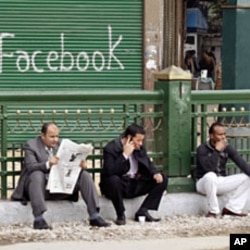Paris-based Reporters Without Borders has condemned the Uganda Communications Commission for ordering telecom companies to block access to social networking websites. The order came earlier this month as activists were planning protests against higher prices and corruption. The commission said it took the action to reduce the threat of violence.
There were disruptions to the websites, but some telecom companies either asked for clarification or refused to comply, and messages still went through. Protests have since been spreading from the capital Kampala to other towns.
Activists across the continent say they are inspired by the social media-energized upheavals in Tunisia and Egypt which toppled long-time rulers. Similar campaigns are being tried from Burkina Faso in western Africa to Swaziland in the south and Ethiopia in the east.
On Facebook, hundreds of Ethiopians have changed their profile photos to posters that have the Amharic word for "Enough." Several groups are calling for nationwide protests on May 28th, 20 years after Prime Minister Meles Zenawi came to power.
William Kalema, whose parents are from Uganda, attended a recent Washington conference called "Wireless Democracy: Innovation in Africa."
Kalema says most Africans initially saw cell phones and Internet technology as offering economic opportunities, but he says much more is now at stake.
"Young Africans are using these technologies and they have not just an economic effect but a political one. They are sort of bringing together people from across the continent," said Kalema.
But Kalema says African governments like Uganda's have proven they are able to intercept messages as Uganda's did during this year's presidential election, reducing the effect of technology-driven protests.
"There is the potential but if governments are not open to it, that potential cannot be realized," said Kalema. "So I think there is definitely the potential for it to have political impact but I was troubled by the fact that intercepting text messages, it sort of undermines that process."
Kalema also points out that the most widely-seen video produced during the campaign showed long-time President Yoweri Museveni rapping, before he won re-election for his fourth term.
Another video which went viral recently - meaning thousands of people showed it to each other - has Angolan rapper Brigadeiro Mata Frakuzx railing against Angola's ruler for the past 32 years, President Jose Eduardo dos Santos.
The rapper was arrested in March for a few hours before a planned midnight protest which had been promoted on Facebook.
While these viral videos are being watched, and protests are being planned, the U.S. State Department is organizing workshops and contests across Africa to promote the use of new technologies to improve governance.
Katie Dowd, whose title is adviser for innovation at the State Department, says her boss, Secretary of State Hillary Clinton, is a strong proponent of Internet freedom.
"Secretary Clinton has an aggressive Internet freedom agenda. It is something that is included in our relations with other countries. It is something that we address," Dowd said. "We have a bureau called democracy, human rights and labor that focuses specifically on addressing Internet freedom and how we make sure it is part of our foreign policy agenda."
Dowd says the U.S. government helps social media activists with training and ideas, as well as support for projects, such as an application designed in Uganda that allows any audio, video or text message depicting alleged corruption to be directly transmitted to legal and media partners.
"We certainly want to encourage tools that enable the broader civic participation and engagement and believe that technology can open up channels of communication and conversation that were not otherwise there," said Dowd. "So where we can add value in that capacity building we certainly want to add value and hope those governments will listen where that is possible."
But some African government officials view such activities as outside meddling, undermining security and state institutions.
Earlier this year, when activists used crowd-sourcing technology (-gathering information from like-minded individuals -) to encourage protests in Sudan's capital Khartoum, a high-ranking member of the ruling party said government "cyber jihadists" would, in his words, crush any Internet-centered dissent. Mandur al-Mahdi said the government has its own "cyber battalion" which he said is at the forefront of online defense operations.
Supporters of the Sudanese ruling party inundated anti-government Facebook pages with their own messages, warning people to stay at home during protests, which quickly fizzled out.





